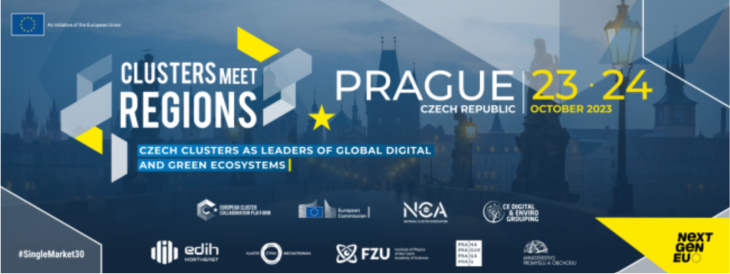Czech Clusters as Leaders of Global Digital and Green Ecosystems: Clusters meet Regions event in Prague
On 23 and 24 October 2023, the European Commission (DG GROW) and the European Cluster Collaboration Platform, in cooperation with the National Cluster Association, CEDEG, Klastr Mechatronika, EDIH NORTHEAST and the Institute of Physics of the Czech Academy of Sciences, organised a two-day workshop in Prague, The Czech Republic. The theme of the event was “Czech Clusters as Leaders of Global Digital and Green Ecosystems.”
The ‘Clusters meet Regions’ event was dedicated to digitalisation, cybersecurity, AI, clean technologies, 3D printing and the VR industry.
The cluster landscape in the Czech Republic continues to flourish each year. The National Cluster Association registers over 100 clusters and technological platforms in the Czech Republic, representing 14 EU Industrial Ecosystems. The cluster environment has witnessed rapid progress in recent years, fostering collaboration among Czech clusters at regional and international levels. Czech clusters and their members serve as exemplary partners for innovative projects and lucrative business prospects, with the potential to benefit European industry and value chains significantly.
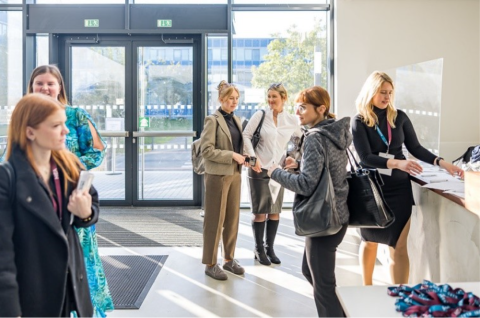
The event was expertly moderated by Jiri Herinek, President of the National Cluster Association, Lubos Komarek, Vice-Chairman of CEDEG, and Katerina Podana, Executive Director of Klastr MECHATRONIKA.
‘Clusters meet Regions’ brought together 44 Czech and 13 EU representatives hailing from various cluster organisations, associations, companies, universities, agencies, and government bodies. Among the EU visitors were individuals from Belgium, Finland, Germany, Greece, Italy, Lithuania, Poland, Romania, Slovakia, Spain, and Ukraine.
Summary Day 1
The opening session commenced with Renata Pfefferova's introduction to the European Cluster Collaboration Platform. This was followed by a warm welcome from the Institute of Physics of the Czech Academy of Sciences Director, Michael Prouza, extending greetings to the participants in the institute's familiar setting. Further introductions followed by representatives from the Prague City Council and the European Commission.
The representative of the Prague City Council, Jaromir Beranek, focused on the RIS3 Strategy of the City of Prague and tools to support innovation in the city, whereas Jitka Vocaskova from the European Commission presented the role of clusters in EU industrial policy.
“The Czech Republic aims to boost middle-income growth through education and labour directives to catch up with more advanced neighbouring countries like Germany and Austria. The City of Prague initiated the RIS3 Strategy (Research and Innovation Strategy for Smart, Specialised and Strategic Development) in 2018, focusing on areas like life sciences, creative industries and new technologies. Organisations like prg.ai and Prague.bio Cluster are driving Prague to become an AI hub. The city is also home to the EU Agency for the Space Programme and a number of innovative companies like PRUSA RESEARCH. The City of Prague plans to establish a science and technological park to foster collaboration among researchers, students, and businesses.” – Jaromir Beranek, Chairman of the International Relations and EU Funds Committee, City of Prague.
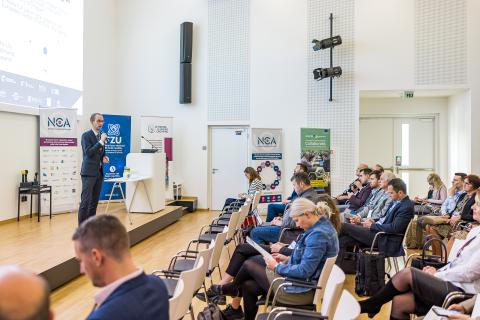
“The European Commission is committed to supporting the organisation of ‘Clusters meet Regions’ events to foster collaboration among clusters and partners and address economic challenges. These challenges, exacerbated by disruptions in supply chains, have highlighted vulnerabilities that need to be addressed. Europe's strengths lie in advanced manufacturing, automotive, and other sectors, but it must also build capacity in emerging industries like artificial intelligence, cybersecurity and robotics. Clusters play a crucial role in promoting collaboration between SMEs, large companies, researchers and public institutions. Czech clusters are well-established, particularly in Industry 4.0 and Energy, with strong export ties to the EU and robust academia-business connections.” – Jitka Vocaskova, DG GROW, European Commission.
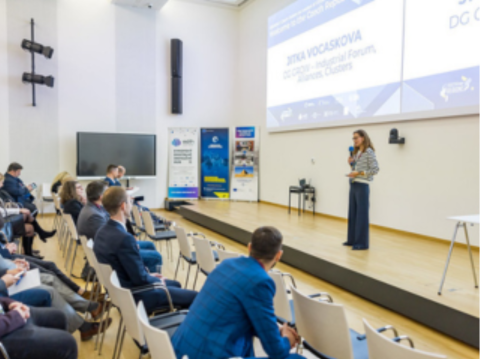
An overview of cluster organisations in the Czech Republic and the supporting role of the National Cluster Association was presented by Jiri Herinek, President of the National Cluster Association, in the ‘Cluster Environment in the Czech Republic: Supporting Cooperation and Innovation’ portion of the event.
The National Cluster Association in the Czech Republic comprises over 100 clusters, collectively uniting 884 companies and 207 other organisations and employing 275,000 people. These Czech clusters represent 14 Industrial Ecosystems, making them valuable partners for collaborations within the EU. The Association takes pride in its Map of Clusters in the Czech Republic, which offers comprehensive insights into these clusters. They also actively engage in various activities like member meetings, cluster events, supporting cybersecurity conferences and participation in European and international cluster initiatives, including the European Cluster Collaboration Platform and the European Clusters Alliance.
The National Cluster Association presented the prestigious Golden Cluster Award and other accolades for 2022 to the following cluster organisations:
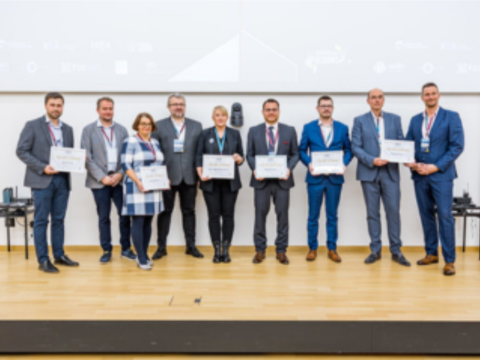
Golden Cluster 2022:
Czech Optical Cluster – for long-term support of the optical ecosystem in the Czech Republic
Honorary Awards:
Czech hemp cluster – for promoting development and innovation in companies
Cluster of Czech Furniture Manufacturers – for the development of internationalisation and promotion of the Czech Republic
CLUTEX - Technical Textile Cluster – for the promotion and development of education
Cluster MECHATRONIKA – for the development of the innovation environment
Young Manager Talent of the Year Kristian Cely, manager of international projects of the CREA Hydro&Energy cluster, for the successful creation and implementation of the action plan for the development of the innovation ecosystem of the South Moravian Region in the field of water management, iWATERMAP project, Interreg Europe and other achievements in the development of the internationalisation of the cluster.
Lennart Galdiga from the European Cluster Collaboration Platform (ECCP) / Prognos AG presented an Input paper analysis of the economic profile of the Czech Republic, national innovation, regional competitiveness and the importance of Czech clusters.
The morning panel discussion delved into regional and national collaboration, facilitating an open dialogue regarding the position of Czech companies in cutting-edge industries during these uncertain times. It explored the ideal support for innovation and featured specific success stories of projects that have thrived with the provided support.
"Be brave enough to win." – Lukas Benzl, Czech AI Association.
"Share and learn." – Petr Prikryl, Czech Optical Cluster
"The Knowledge Transfer Partnership is one of the most successful projects in the Czech Republic." – Robert Wenzel, Ministry of Industry and Trade of the Czech Republic.
Session two, ‘The use of artificial intelligence and cybersecurity in the manufacturing sector’, was dedicated to modern digital solutions and cutting-edge technologies. The session was led by Lubos Komarek, Vice-Chairman of CEDEG.
Lukas Benzl from the Czech AI Association shared a bittersweet view of computer vision.
Ales Roman from IdStory emphasised efficient access to IT services.
Zdenka Dolezalova introduced the project EDIH NORTHEAST and its services.
Kristina Sermuksnyte-Alesiuniene from AgriFood Lithuania explored artificial intelligence and cybersecurity in the production of agricultural and food products.
The third session was dedicated to Real Examples and Implementation of Clean Technologies, 3D Printing and the Virtual Reality industry. This session was moderated by Katerina Podana, Executive Director Klastr MECHATRONIKA:
Thomas Ramming from Bayern Innovativ GmbH shared insights into the flourishing cross-border cooperation between Bavaria, the Czech Republic, Upper Palatinate and Lower Bavaria.
Michal Zemko from COMTES FHT delved into the myriad benefits of metal printing within the industrial sector.
Alena Lochmannova from XR Institute underscored the impactful utilisation of virtual reality (VR) across various medical and emergency service disciplines.
The concluding panel discussion on Enhancing Collaboration Among Clusters and Innovation Stakeholders at Regional, National, and Global Scales sparked a compelling dialogue on diverse topics. These included international cluster initiatives, the advantages and potential enhancements of the ECCP platform, and strategies for clusters to bolster the global expansion of their member companies, among other pertinent matters.
Summary Day 2
On the second day of the event, there was a Pitching session and the official EU Matchmaking session. During the Pitching session, ten clusters organised from the Czech Republic, Poland, Italy and Finland presented their needs and requirements. Afterwards, thirty productive meetings took place where the participants clarified their needs and offers and discussed possibilities for cooperation.
-
BizGarden – Downstream use of space technology and digitalisation in tourism
-
CREA Hydro&Energy – Water Technologies
-
Czech Hemp Cluster – Legislation on medicinal hemp and promotion of industrial hemp cultivation
-
Czech Optical Cluster – Technical Optics and Photonics
-
EnergyVaasa – Electrical solutions, sustainable energy, flexible power generation and digitalisation
-
Evolute Project – Automotive and Land Machinery Industry
-
HR Development Cluster – Human Resources
-
Klastr MECHATRONIKA – Additive manufacturing and 3D Printing
-
NANOPROGRESS – Nanotechnologies
-
Sinotaic – Field of IoT and AI
